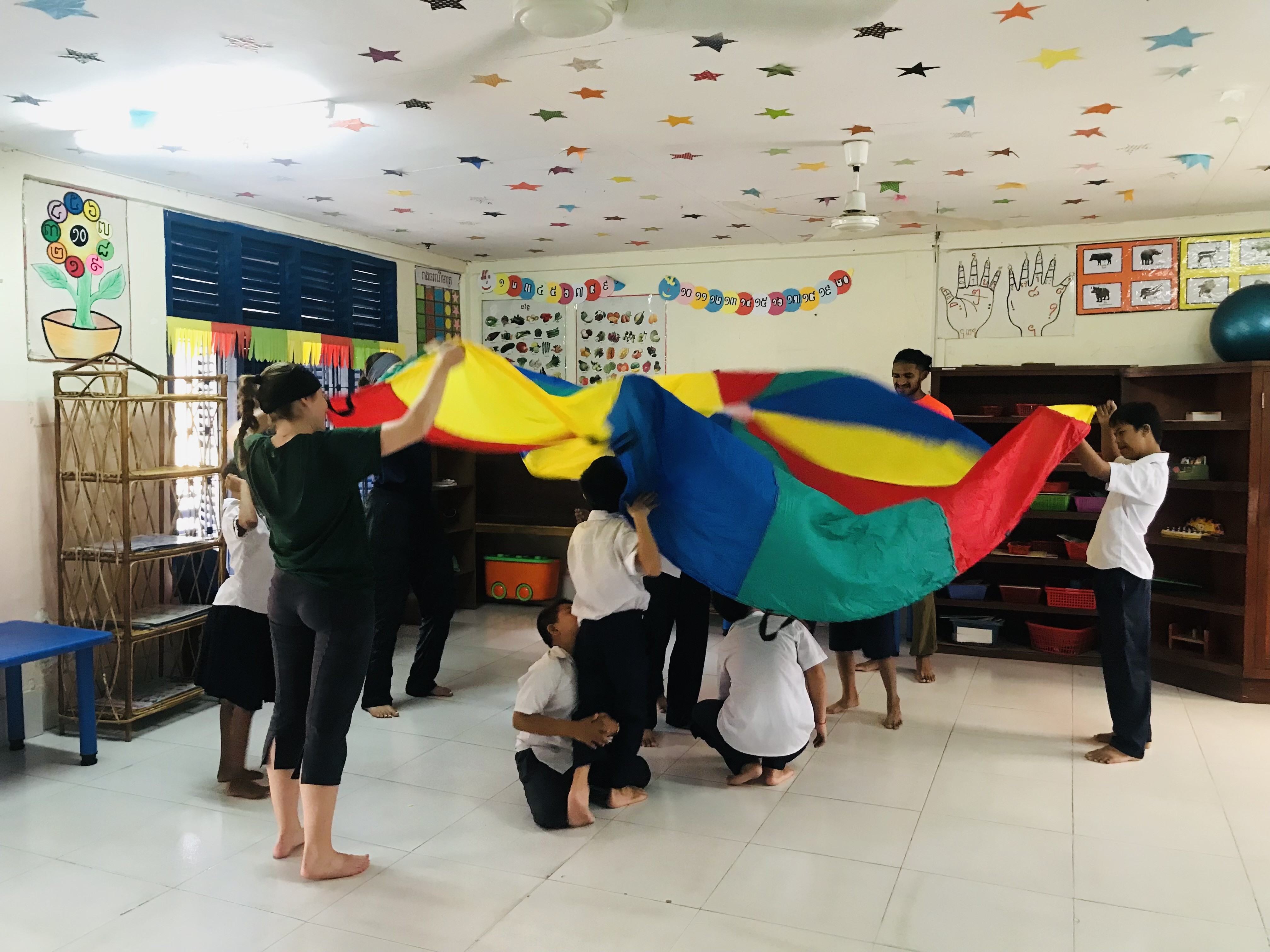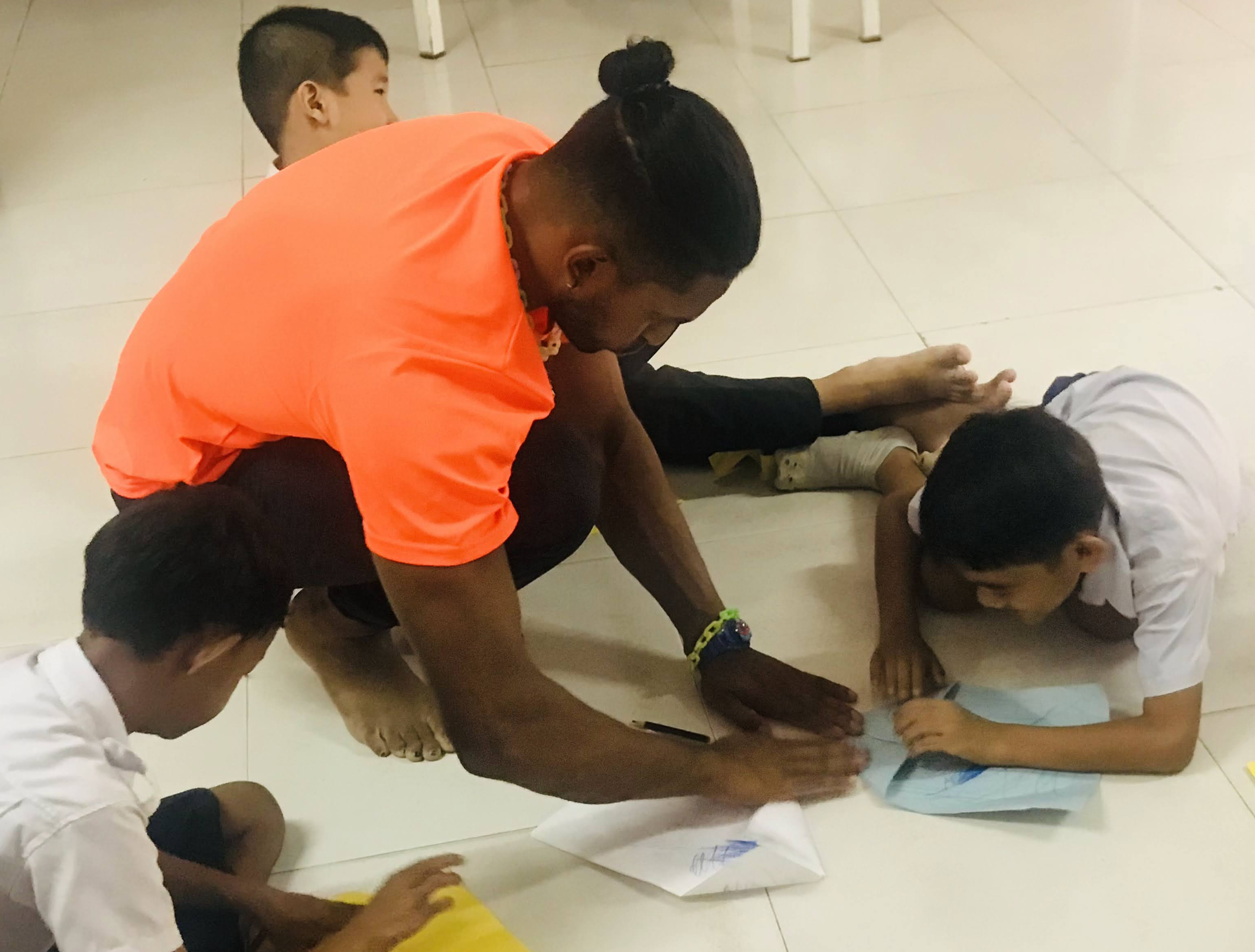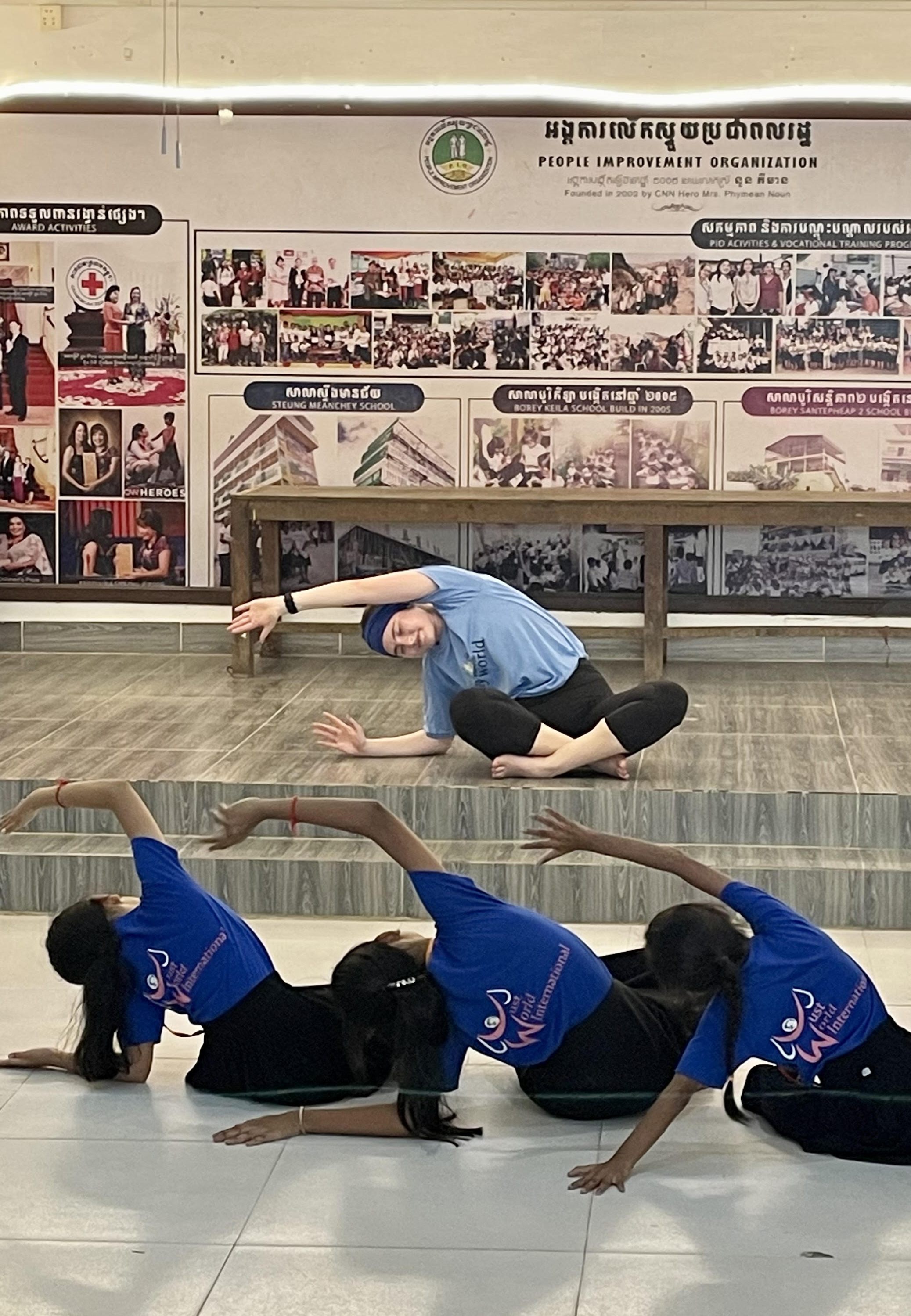The universal language of play
Shirley Wilfong-Pritchard - 14 May 2024

PAW participants Courtney Reid and Johann Gnanapragasam play parachute games with a primary class in Phnom Penh, Cambodia.
Driven by a passion for working with children and an interest in travel, Courtney Reid was drawn to the Faculty of Kinesiology, Sport, and Recreation’s Play Around the World program. “The PAW program's focus on play and recreation aligns perfectly with my values,” says Reid, who is graduating this year with an after-degree in elementary education. “I also knew it would be an amazing learning opportunity as a future educator.”
For KSR student Johann Gnanapragasam, the experience exceeded expectations. “Even though I’ve taught kids my whole life, PAW provided a teaching experience much different than I could have imagined, from orchestrating a play day for 1,000 children with only three PAW members to developing activities for every age from kindergarten to high school.”
PAW upholds the child’s right to play as outlined in the United Nations Convention on the Rights of the Child while providing a global education and intercultural experience to University of Alberta students. Participants develop global awareness and citizenry by working with schools, orphanages, community-based organizations or government agencies to deliver play, recreation, physical activity and sport to children and youth of all abilities. Originally founded by then-professor Jane Vallentyne in 2001 for Thailand, the program now includes student placement locations in Cambodia, Thailand, Peru and Canada. The current director is Mary Ann Rintoul.
During the summer of 2023, Reid and Gnanapragasam worked at kindergartens in Cambodia for three months, broadening their worldview by living and working in a different culture. “Something that stood out to me was the kindness of everyone I met — amazing people who shared their stories, perspectives and experiences with me,” says Reid.
Gnanapragasam adds, “It is one thing to travel to another country, but another thing completely to live and work being fully immersed in the culture. I found the Cambodian people to be very friendly and family-oriented. They were so helpful and some would even treat me like their own son. I was able to spend time celebrating birthdays, singing karaoke, trying various foods, playing various sports (hockey and volleyball), and building really strong friendships with the
people there.”
 Participating in the PAW program drove home the importance of play and recreation for children. “Experiencing play and working with children each day was such a learning experience,” says Reid. “I learned how universal the language of play is. It was amazing to see how naturally the children communicated through play, creating spontaneous and inventive play without the need for words. It changed the way I approach working with children.”
Participating in the PAW program drove home the importance of play and recreation for children. “Experiencing play and working with children each day was such a learning experience,” says Reid. “I learned how universal the language of play is. It was amazing to see how naturally the children communicated through play, creating spontaneous and inventive play without the need for words. It changed the way I approach working with children.”
“My favourite part about it all was the job itself,” says Gnanapragasam. “The kids there are so amazing and completely engaged in every activity you show them.”
The U of A students also learned how to push themselves outside their comfort zones. “No matter what kind of day I was having, I was looking forward to playing with the kids because it allowed me to be a kid myself and get lost in the play too,” says Gnanapragasam. “They would have so much energy that it rubbed off onto me.”
“There were times when it was hard to be away from loved ones back home,” says Reid. “But it was great to have so much support through the program and my teammates.”
One of the challenges was learning to speak Khmer, although the language barrier was much easier to navigate than they first expected. “Everyone was so patient when we were trying to speak Khmer, Reid recalls, laughing. “I remember thinking I was telling the children to ‘stand’ while they were sitting but I was saying ‘sit.’ The kids had some confused looks!”
Both Reid and Gnanapragasam completed projects during the PAW program that were shared with their placement hosts in Cambodia.
 Reid developed a kindergarten play-based learning resource, detailing the importance of play as a learning tool; strategies for teachers to engage with students using guiding questions; methods for integrating play-based learning centres; and several play-based learning games and activities.
Reid developed a kindergarten play-based learning resource, detailing the importance of play as a learning tool; strategies for teachers to engage with students using guiding questions; methods for integrating play-based learning centres; and several play-based learning games and activities.
Gnanapragasam created a practical play day manual that includes the many things one needs to consider when planning a play day, such as budget, number of adults to help, obstacles, map of the play stations and an equipment list. He includes how-tos for several stations as a guide for play leaders to animate the spaces — leader-led games, water play, loose parts (things children can manipulate and change, such as boxes), sports free play, obstacle course and arts and crafts. There is a schedule for the day and an area for reflection on lessons learned.
Reid will be taking her PAW experience into her teaching career. “It will help me connect with students learning English,” she says. “I also saw first-hand the benefits of play and will incorporate play into my classroom as much as possible. I believe it’s so important and children can learn in many ways through play. PAW also helped me be flexible and adapt my activities on the fly in response to the children. I think this skill is so applicable to teaching.”
“I am so grateful for the experience I had and I would like to thank Mary Ann for leading such an amazing program!” says Reid. “For everyone in PAW or thinking about joining PAW, keep the joy of play alive in all your endeavours!”
“The PAW experience afforded me one of the best summers I’ve ever had,” concludes Gnanapragasam. “I am grateful for the PAW program and the impact everyone in Cambodia had on me, as well as the support from everyone, especially my leader Kenadi and Professor Mary Ann Rintoul. I can’t wait to hear about the adventures of future PAW students!”
“I’m often amazed at PAW’s long-term impact on students,” says Rintoul. “When former PAW students share their stories and reflections, I can see how transformative their learning journey has been. Beyond the three-month PAW experience, students’ expanded worldview continues to contribute to the greater good in their local communities.”